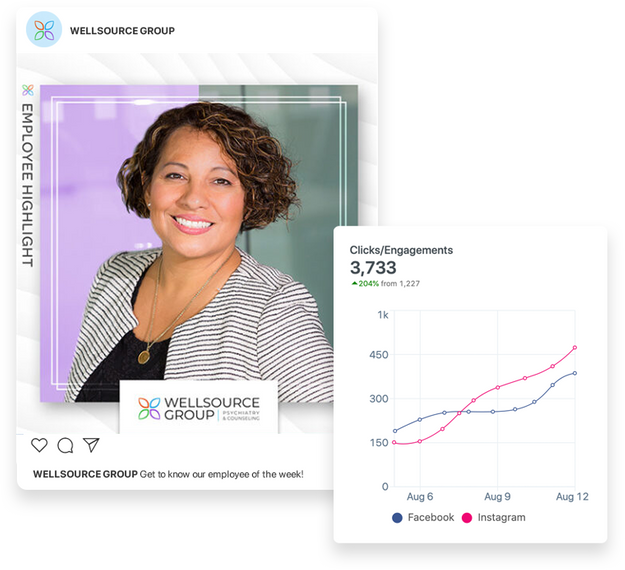Therapist Social Media
#1 Marketing Platform® for Therapists
- Marketing
- SEO & Content
- Social Media
- Websites
- Platform
Build local trust and awareness with social marketing for therapists
Get more patients by building local trust and awareness with our social media marketing program for therapists — stand out in your community.
Why therapists need social media management
To grow your therapy practice and get in front of new patients in your community, you need to build a visible presence wherever they’re spending their time online. These days, that’s on Facebook, Instagram and other social media platforms.
An effective social media management strategy can improve your patient awareness and reach more prospective patients. You can also use social media to build strong relationships, provide real-time customer service and grow your therapy practice.
Social media management for therapists involves creating and sharing content, monitoring and responding to comments and messages, analyzing your social media performance and more. It can be time-consuming, but it's an essential therapist marketing channel.
We can help you master social media management
7 benefits of social media management for therapists
1. Increase brand recognition
When someone needs therapy, you want to be the first therapist they think about turning to. The right social media management strategy can help increase the number of patients who are familiar with your name and your brand. This, in turn, can help increase patient recognition of your therapy services.
2. Build community connections
Community connections are important for any business, but they’re especially important for therapists. Why? Because part of what makes therapy effective is the relationship between the therapist and the patient. Social media management strategy can help you connect with potential patients in your community, learn more about their needs and build strong connections.
3. Showcase your expertise
Trust is a critical part of driving leads, converting patients and growing your therapy practice. When it comes to social media, content is king. A well-executed social media management strategy will help you share content that showcases your expertise and helps build trust with potential patients.
4. Humanize your retail store
In today’s world, it’s more important than ever to humanize your therapy practice. Social media provides an opportunity to show the faces behind your business and share your unique story. This can make your therapy practice more memorable and relatable, and help potential patients feel more comfortable reaching out for help.
5. Drive traffic to your retail store website
If you want potential patients to find your therapy website, you need to make sure your website is optimized for search engines. But, you also need to drive traffic to your website. A social media management strategy can help you do both. By sharing links to your website on social media, you can help increase website traffic and improve your website’s search engine ranking.
6. Get to know your customer base
Social media provides an opportunity to get to know your patients on a more personal level. You can learn about their interests, their needs and what they’re looking for in a therapist. This information can help you tailor your services to better reach new leads and patients, as well as to meet their needs.
7. Win customers and sales
A well-executed social media management strategy can help you win leads and patients. By sharing helpful, relevant content and building strong relationships with potential patients, you can increase the number of people who recognize and trust your brand, visit your therapist website and reach out to you for help.
The best social media platforms for therapists
Google Business Profile
The search for local therapy services often starts on Google. Google Business Profile is a free listing that appears in Google Maps and Google Search, and having an optimized Google Business Profile can help you get found in local searches. Increase your rankings by getting reviews and having a high average star rating.
Facebook
Facebook is a great platform for connecting with potential patients in your community and sharing your story because it's incredibly popular with people of all ages. You can use Facebook to share helpful blog posts, showcase your therapy services and build relationships with potential patients.
LinkedIn
LinkedIn is a professional platform that's ideal for connecting with other professionals in the therapy industry, sharing your story and showcasing your expertise. LinkedIn is a great place to share helpful blog posts, case studies and articles, participate in discussions and build relationships with other local businesses and mental health professionals.
Instagram
Instagram is a visually-driven platform that's great for sharing before-and-after photos, testimonials and other visuals that showcase your therapy services. With Instagram, you can share behind-the-scenes photos and videos, give potential patients a glimpse into your day-to-day work and build relationships with potential patients.
YouTube
YouTube is a great platform for sharing video content, and it can be a powerful tool for therapists. You can use YouTube to share testimonials, educational videos and other types of content that showcase your expertise and help potential patients learn more about your therapy services.

How to make your therapist's social media profiles stand out
Choose the right profile picture
Most of the time, your profile picture is the first thing potential patients will see when they visit your social media profile, so it's important to choose a picture that makes a good impression. Choose a picture that's professional, shows you in a positive light and is representative of your therapy practice.
Write an engaging bio
Your bio is another important element of your social media profile. Your bio should be brief, but it should also be engaging and give potential patients an idea of what you're all about. Use your bio to share your story, showcase your personality and highlight what makes your therapy practice unique.
Ensure brand consistency
It's important to ensure brand consistency across all of your social media profiles. This means using the same profile picture, cover photo, bio and branding on all of your profiles. This will help potential patients easily recognize your brand on social media and know that they're in the right place.
Use relevant keywords
When potential patients are searching for therapy services, you want to make sure your social media profiles come up in the search results. You can increase your chances of being found by using relevant keywords in your profile, bio and posts. Just make sure that you always use keywords naturally and avoid forcing them into your content.
Establish a voice for your online store
Your social media profile is a great place to establish a voice for your therapy practice. This means choosing a tone that is consistent with your brand and using it in all of your social media content. Establishing a voice will help you keep your brand consistent on social media and give users an idea of what to expect if they follow you.
Post high-quality content
When it comes to social media, content is king. That's why it's important to post high-quality content that is relevant to your target audience. Share blog posts, infographics, videos and other types of content that potential patients will find helpful. And make sure to post regularly to keep your social media profiles active.
Engage with your audience
Social media is all about engagement. When you post content on social media, make sure to respond to any comments and questions in a timely manner. Being proactive about engaging with your followers will help you build relationships with potential patients and make them more likely to reach out to you for help.
Use social media management software
Social media management software can help you save time and be more effective with your therapist social media marketing strategy. The Marketing 360® Social app offers incredible features, like content scheduling, performance monitoring and more. These features will help you better understand your audience, save time on social media and win more patients.

What to post on social media for therapists
Therapy practice updates
Your social media followers want to know what’s going on with your therapy practice. If you have any news or updates to share about your therapy practice, social media is a great place to do it. You can use social media to share new blog posts, announce changes to your practice, share patient success stories and more.
Educational content
Posting educational content on social media is a fantastic way to showcase your expertise and help potential patients learn more about your therapy services and mental health in general. You can use social media to share blog posts, infographics, videos and other types of content that potential patients will find helpful.
Promotions
If you're running any promotions or special offers, social media is a great place to share them. You can use social media to promote new services, offer discounts on therapy services and more. Just make sure to include all the relevant details in your posts so potential patients know what they need to do to take advantage of your offer.
Answers to FAQs
Answering FAQs is a wonderful way to help potential patients learn more about your therapy services and what to expect from therapy. You can use social media to answer common questions about therapy, share helpful tips and advice, and dispel any myths or misconceptions about therapy or mental health.
Patient feedback and reviews
Sharing patient feedback and reviews is a great way to build trust with potential patients and showcase the success of your therapy services. You can use social media to share patient testimonial videos, five-star reviews and other types of content that will help potential patients see the results your therapy services can achieve.
Relevant news stories
If there are any relevant news stories about therapy or mental health, social media is a great place to share them. You can use social media to share your professional opinion about relevant news stories, blog posts, articles and other types of content that potential patients will find helpful.
Therapy memes and humor
Humor is an incredible way to connect with potential patients and show them that therapy can be fun. You can use social media to share therapy memes, jokes, GIFs and other types of content that will make potential patients laugh, help them see the lighter side of therapy and remember your practice.
We can help you create great social media content
Social media management FAQs for therapists
Why is social media management important for therapists?
Social media management is important for therapists because it helps them increase patient recognition, build community connections, showcase their expertise, humanize their therapy practice, drive website traffic, get to know their patients, and win leads and patients. It's a must-have marketing channel for modern therapists.
How do you create an effective therapist social media strategy?
There are a few key components to creating an effective therapist social media strategy. First, choose the right social media platforms for your target audience. Then, establish a voice for your therapy practice and create high-quality content that is relevant to your target audience. Finally, engage with your audience and use social media management software.
What are the rules therapists need to follow on social media?
Therapists using social media to grow their practices need to prioritize patient confidentiality. This means using a pseudonym for patients, not sharing any identifying information and being careful about what you post. In addition, it's important to be professional, respectful and helpful in all of your social media interactions.
How often should a therapist post on social media?
The frequency of your social media posts will depend on your specific social media goals, the platform you're using and your audience. That being said, it's generally a good idea to post regularly to keep your social media profiles active. Try to post at least once a week, and if you can, aim for two to three times a week.
Tour Therapist Marketing
Get everything you need to manage and grow your business.
Plus, explore free account tools. No credit card required.




